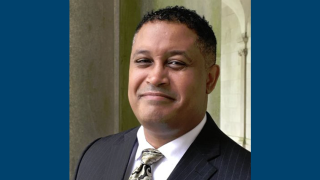
Virtual reality. Deep community engagement. The reinvention of … everything. These aren’t the typical interests and goals of a history professor. But then again, Dr. Walter Greason isn’t your typical history professor. With his first semester as the new chair of Macalester’s History Department under his belt, the East Coast-transplant and former professor at Monmouth University shares his vision for the department and what drives him as a scholar and teacher.
What do you specialize in as a historian?
I live at the intersection of history, education, economics and media. I look at historical evidence and examine the ways these intersections show up in the media at the time, the way they affect the economic system, the way they take precedence from previous historical cycles, and ultimately, the ways we can better educate people about these intersections.
A core part of this work has been about urban history and the ways that large cities change over time. My dissertation, for example, was on suburbanization, but not from the point of view of cities, but rather how rural areas viewed the encroaching population growth. As a scholar, I’m committed to finding different approaches and perspectives.
What attracted you to Macalester?
When I got the interview and started looking at the website, the opening banner said, “Where ideas matter.” I knew then that I was being considered to join a community that shared my core values. The work for me is so much about coming up with new ideas and building them in our communities. Macalester’s combination of multiculturalism and internationalism, the way it’s about service to humanity, these are all things that are deep in my heart.
As its new chair, what is your vision for the future of the history department?
What the department has done well over time is to explore international questions of labor, capital, and the way that changing markets in places like Latin America have shaped what we experience as the world’s society now. The History Department is going to move aggressively in that same direction, where we take on the questions of decolonization, and how we can build a world that’s sustainable, both environmentally and culturally.
If there had been a respectful exchange between Europeans, Africans and Indigenous populations around the world 500 years ago, what could have been possible? We have the opportunity to do that work right now at Macalester.
In your portfolio, you have a lot of work that is not just for the academy or the classroom. Why is being a public impact scholar important to you?
Much of my life has been about changing the material conditions for people on the margins of society. Starting when I was 12, I spent six years creating a program to provide food for folks in our community who needed it. So public engagement has always been a core commitment of mine, I just had to learn to be a scholar.
For me, it’s not only about scholarship for the sake of knowledge, it’s about the application of that knowledge through public policy and nonprofit intervention that makes a stronger, more sustainable community. For example, I recently had a meeting with students in Minneapolis who are from foster homes and who are involved in the juvenile justice system and are trying to find ways to build better lives for themselves. That’s an example of what I think we can do here.
To that end, where do you see new opportunities for history students to become even more engaged with the local community?
I think at the top of my list are partnerships with organizations like the Mayo Clinic and 3M. Both have very different legacies in the region as anchor institutions, but when we partner with them as a college, and particularly as a department, there are ways that we open up doors for historians to not just be scholars or lawyers or public planners in the ways that people in my field have been traditionally. For example, my students this fall discovered all the different ways that they can combine history with new technological and financial tools to actually invent whole new industries. That’s what I see as the future for our history students: To find ways to reinvent everything we know.
If you were to pick one, what career accomplishment are you most proud of?
My goodness … I think it’s still something pretty close to home back in New Jersey. One page in a book I wrote about suburban development there introduced a historical figure that everybody had forgotten about – a man named Thomas Fortune. His home had been allowed to deteriorate over forty years, and we put together a financial model to save it, restore it and to fund it indefinitely. To save a national historic landmark, to restore a man’s name and legacy into the historical narrative, and then to provide the financial means for that restoration, all of my work going forward is based on that achievement.
What projects are you working on right now?
My main scholarly project is something I’ve been building for a decade. It is a comparative history of industrialization around the world. What I’m most excited about is that it will not just be a book that explores economic histories, but also a vast array of multimedia tools, from interactive infographics to virtual reality resources.
You’re a lifelong East Coast resident. What’s been the biggest adjustment to life in the Twin Cities?
Coming up in New Jersey and then going to school in Pennsylvania, there’s a pace to the day and what you’re expected to get done. One of the things I love most about moving to the Twin Cities is that there’s a whole different sense of how to balance your time and your life. I’m learning to slow myself and enjoy the moments as they happen.
February 3 2022
Back to top




